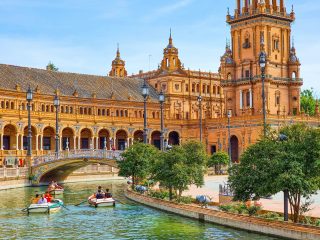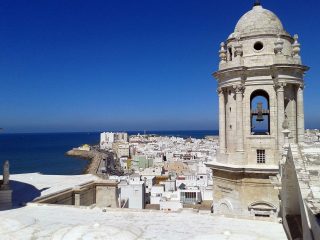Cádiz Roman Theatre
Ruins in Cádiz

The Roman Theater of Cádiz sits quietly in the seaward edge of the Barrio del Pópulo, its vast ruins concealed behind narrow medieval streets. Although large sections can be glimpsed from Avenida Campo del Sur, the official entrance is tucked away on Calle Mesón 11-13. This hidden approach adds an element of discovery to one of the must-see places in Cádiz for travellers interested in ancient history, archaeology, and the layered past of one of Europe's oldest cities.
The story of the theatre begins long before the Romans arrived. The Carthaginian Empire controlled Gadir (present-day Cádiz) from around 500 BC until 206 BC, when the Romans defeated them during the Second Punic War. In 49 BC Julius Caesar renamed the city Gades and granted it municipal status. Around 70 BC, Lucius Cornelius Balbus the Elder-Caesar's close associate and a wealthy native of Cádiz-along with his nephew, Balbus the Younger, expanded the city by creating a new district called Neapolis. It was here that they built a massive theatre capable of seating 20,000 spectators. Long buried beneath later structures, the ruins were rediscovered in 1980 and continue to be excavated today. Visiting this site is a highlight of any walking tour of Cádiz for those fascinated by the city's deep historical layers.
Table of Contents
- History and Significance of the Roman Theater of Cádiz
- Things to See and Do in the Roman Theater of Cádiz
- How to Get to the Roman Theater of Cádiz
- Practical Tips on Visiting the Roman Theater of Cádiz
- Where to Stay close to the Roman Theater of Cádiz
- Is the Roman Theater of Cádiz Worth Visiting?
- FAQs for Visiting the Roman Theater of Cádiz
- Nearby Attractions to the Roman Theater of Cádiz
History and Significance of the Roman Theater of Cádiz
Dating back to the 1st century BC, the Roman Theater of Gades is believed to be one of the oldest and largest in Spain. Constructed during the ambitious urban expansion led by the Balbus family, the theatre was designed to showcase Roman culture in a flourishing Atlantic port city.
The theatre thrived during the early imperial period but was abandoned by the 4th century as the Roman world shifted and urban life changed. By the 13th century, medieval builders unknowingly constructed a fortress over the site, later referred to as the “Castle of the Theater.” This protected the ruins but also obscured them for centuries.
When excavations began in 1980, archaeologists uncovered a horseshoe-shaped cavea (auditorium), parabolic tiered seating, and parts of the stage complex. The discovery dramatically expanded our understanding of Roman Cádiz, making the site one of the things to do in Cádiz for history enthusiasts.
Things to See and Do in the Roman Theater of Cádiz
Begin your visit by entering through the narrow doorway on Calle Mesón, which leads you into an informative museum explaining the city’s transition from Phoenician to Roman rule. Exhibits include architectural models, artefacts, and interactive displays that help contextualise the site.
Descending toward the ruins, you’ll see the parabolic seating carved into the natural slope of the hill-an ingenious Roman design choice that improved acoustics and stability. The horseshoe-shaped auditorium is particularly striking, giving a sense of how large and impressive this theatre once was.
Be sure to explore the walkways overlooking the excavated areas. These elevated paths offer excellent viewing angles and help visitors appreciate both the scale of the theatre and the medieval structures built on top of it. Photography enthusiasts will enjoy capturing the contrasts between ancient stone, medieval walls, and the modern city above.
How to Get to the Roman Theater of Cádiz
The site is located in the Barrio del Pópulo, close to the seafront and within walking distance of many central attractions.
Travelling by air, visitors typically use Jerez Airport or Seville Airport, continuing to Cádiz by train or bus. For the best deals and a seamless booking experience, check out these flights to Cádiz on Booking.com.
If arriving by train, Cádiz station is roughly a 10-15 minute walk from the theatre. Local buses and taxis can also bring you close to the Barrio del Pópulo. Train schedules and bookings can be found on Omio.
If travelling by car, park in one of Cádiz’s nearby public car parks, then walk through the narrow medieval streets to Calle Mesón. Driving in the old town is not recommended. If you are looking to rent a car in Spain I recommend having a look at Discover Cars, first, as they compare prices and review multiple car rental agencies for you.
Practical Tips on Visiting the Roman Theater of Cádiz
- Best time to visit the Roman Theater of Cádiz: Morning or late afternoon for cooler temperatures.
- Entrance fee in Euros: Free entry.
- Opening hours: Vary seasonally; closed on some Mondays.
- Official website: Check Cádiz cultural listings for the latest information.
- How long to spend: 45-60 minutes.
- Accessibility: Some steps and uneven surfaces; not fully accessible.
- Facilities: Restrooms available at the entrance; small exhibition area.
- Photography tip: Capture the contrast between the ancient seating and the medieval structures overhead.
- Guided tours: Available through local cultural programmes.
- Nearby food options: Numerous tapas bars and cafés in the Barrio del Pópulo and nearby streets.
Where to Stay close to the Roman Theater of Cádiz
Staying in the old town puts you within easy reach of the theatre and many historic attractions. Consider Hotel La Catedral for a central location with classic charm. For comfort and convenience, Senator Cádiz Spa Hotel is an excellent choice. Travellers seeking sea views and modern architecture may prefer Parador de Cádiz.
Is the Roman Theater of Cádiz Worth Visiting?
Absolutely. As one of the largest and oldest Roman theatres in Spain, this site offers a rare glimpse into Cádiz's ancient past. Its dramatic layers-from Phoenician beginnings to Roman grandeur to medieval fortification-make it one of the best places to visit in Cádiz for anyone with an interest in archaeology, history, or architecture.
What Other Travellers Say...
Reviews Summary
Teatro Romano de Cádiz, located on C. Mesón 11–13 in Cádiz, is a partially excavated Roman theatre once large enough for thousands; visitors praise the well‑preserved ruins and museum, note free entry, friendly staff, and informative displays, and recommend walking through the ancient passages and up to the observation areas for good views, while pointing out that the site is compact, can be peaceful with few other visitors, and lacks on‑site restrooms.
FAQs for Visiting the Roman Theater of Cádiz
Nearby Attractions to the Roman Theater of Cádiz
- Cádiz Cathedral - A golden-domed landmark overlooking the seafront.
- Torre Tavira - A baroque watchtower with a Camera Obscura.
- Mercado Central de Abastos - A lively market offering fresh seafood and tapas.
- Castillo de Santa Catalina - A historic fortress with coastal views.
- Plaza de San Juan de Dios - A lively square with cafés and historic buildings.
The Cádiz Roman Theatre appears in our Complete Guide to Visiting Cádiz!

Moira & Andy
Hey! We're Moira & Andy. From hiking the Camino to trips around Europe in Bert our campervan — we've been traveling together since retirement in 2020!
This website uses affiliate links which may earn a commission at no additional cost to you!
Nearby Attractions
- Casa Palacio del Almirante (0.0) km
Historic Building, Historic Site and Palace - Church Santa Cruz (Old Cadiz Cathedral) (0.1) km
Cathedral, Church and Religious Building - Arco de los Blancos (0.1) km
Area and Historic Building - Arco del Pópulo (0.1) km
Historic Building - City Hall of Cádiz (0.1) km
Attraction, Historic Building and Town Hall - Cádiz Cathedral (0.1) km
Cathedral and Historic Building - Freiduria Las Flores 1 (0.4) km
Attraction and Café - Mercado Central (0.4) km
Market - Gadir Archaeological Site (0.5) km
Historic Site - Puerta de Tierra (0.5) km
Historic Building



